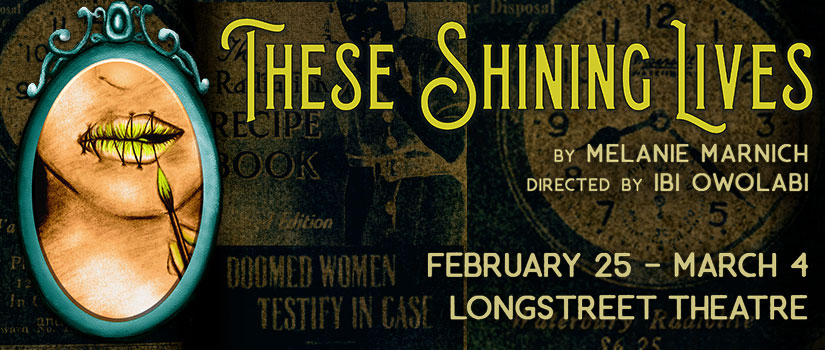Purchase Tickets
The University of South Carolina Dept. of Theatre and Dance will present These Shining Lives, a drama based on the tragic yet inspiring true story of the “radium girls,” February 25 – March 4 at Longstreet Theatre.
Show time is at 8 p.m. Tuesday through Saturday, with additional 3 p.m. matinee performances on Saturday, February 26 and Sunday, February 27. Admission is $15 for students, $20 for UofSC faculty/staff, military, and seniors 60+, and $22 for the public. Tickets may be purchased online at sc.universitytickets.com. Longstreet Theatre is located at 1300 Greene St. Enter from the rear breezeway off Sumter St. In keeping with university safety protocols, masks will be required of all audience members, actors and crew, and seating will be limited to allow for appropriate social distancing between all patrons.
Based on actual events, These Shining Lives reaches back almost a century to uncover a harrowing history that still has profound resonance to our society today. Through poetic and powerful language, playwright Melanie Marnich tells the fateful story of female factory workers in the 1920s hired to decorate watch faces with glow-in-the-dark, radium-based paint, a substance their employer refers to as “medicinal.” As they begin developing serious illnesses from radiation exposure, they soon realize the company’s complicity and wage a legal battle to bring it to justice. The case would go on to have far-reaching consequences on workers’ and women's rights in our own time.
Guest artist Ibi Owolabi, an Atlanta-based professional theatre director, has returned to campus to helm the production. Owolabi previously directed You on the Moors Now in April 2021 for the university.
If we were to do this play even two years ago, our mindset would have been so different. After experiencing the pandemic for as long as we have, I think we understand fear in regard to mortality and sickness a lot differently than we did before.
Ibi Owolabi, Director
The director says the experience of the women portrayed in the play feels especially relevant now, as we enter the third year of a pandemic that has so drastically affected the way we live and work.
“If we were to do this play even two years ago, our mindset would have been so different,” she says. “After experiencing the pandemic for as long as we have, I think we understand fear in regard to mortality and sickness a lot differently than we did before.”
The story’s parallels to recent pandemic-related labor issues also resonates with the director. “[The pandemic] has put things in perspective,” she explains. “The ‘great resignation’ that we’ve seen happen recently, with people not accepting the same working conditions they did before the pandemic, reminds me of how our perspective changes when we’re faced with a life and death situation.”
The historical facts of the “radium girls” case can seem like a horror story. Employees of the U.S. Radium Corporation, the women were required to keep their paintbrushes sharp by “pointing” them between their lips. With repeated exposure over several years, radium seeped into the workers’ bones, causing anemia, jaw decay, spinal collapse and, in some cases, death. However, Owolabi says Marnich’s retelling of the story isn’t all gruesome details and tragic outcomes.
“What I think this play does so well is that it focuses on the humanity of these women in addition to the facts. [Marnich] unfurls the history in a way that is suspenseful but also feels like a personal journey.”
Cast in the production are undergraduates Jesse Breazeale, Zoe Chan, Maddie Niles, Emily Paton and Alec Thorn, and graduate theatre student Isabella Stenz. The production’s designers include graduate theatre design students Ashley Jensen (scenic) and Kyla Little (costume), undergraduate media arts students Aubrey Eastin and Rylee Milz (projections), theatre design professor Jim Hunter (lighting), and guest artist Danielle Wilson (sound).
Owolabi sums it all up as “a riveting look at what seemed like a shining opportunity for these women. It’s about what it means to assert your individuality and to assert your humanity when you’re faced with a corporate giant.”
“I think the playwright really gave these women justice.”
For more information on These Shining Lives or the theatre program at the University of South Carolina, contact Kevin Bush by phone at 803-777-9353 or via email at bushk@mailbox.sc.edu.
